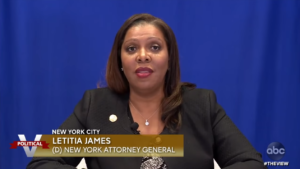
By Dave Workman
Editor-in-Chief
A New York state court judge has ruled the National Rifle Association cannot be dissolved as part of a lawsuit brought against the association and its key leaders by New York State Attorney General Letitia James.
According to Justice Joel Cohen of a New York state court in Manhattan, the effort to dissolve NRA is dismissed, but the door remains open for James to “seek the ouster” of longtime CEO Wayne LaPierre.
Reuters is reporting the ruling, which is being spun by both sides. The ruling may be read here.
James released a prepared statement in which she contended, “The court affirmed my office’s right to pursue its long-standing claims that fraud, abuse, and greed permeate through the NRA and its senior leadership. While we’re heartened that the judge rejected the NRA’s attempts to thwart most of the claims in our case against the NRA, we are disappointed that the judge ruled against the dissolution portion of the case. We are considering our legal options with respect to this ruling. We remain committed to enforcing New York law regardless of how powerful any individual or organization may be.”
On the other hand, NRA released its own perspective, asserting it had won “a major legal victory.”
“This is a resounding win for the NRA, its 5 million members, and all who believe in this organization,” said NRA President Charles Cotton. “The message is loud and clear: the NRA is strong and secure in its mission to protect constitutional freedom.”
“We applaud the court’s recognition that dissolution is neither appropriate nor justified,” said William A. Brewer III, partner at Brewer, Attorneys & Counselors and counsel to the NRA. “We look forward to continuing the defense of the NRA – and proving that it acts in the best interests of its members and the Second Amendment freedoms in which they believe.”
In his ruling, Judge Cohen observed, “The Attorney General’s claims to dissolve the NRA are dismissed. Her allegations concern primarily private harm to the NRA and its members and donors, which if proven can be addressed by the targeted, less intrusive relief she seeks through other claims in her Complaint. The Complaint does not allege that any financial misconduct benefited the NRA, or that the NRA exists primarily to carry out such activity, or that the NRA is incapable of continuing its legitimate activities on behalf of its millions of members. In short, the Complaint does not allege the type of public harm that is the legal linchpin for imposing the ‘corporate death penalty.’
“Moreover,” the judge continued, “dissolving the NRA could impinge, at least indirectly, on the free speech and assembly rights of its millions of members. While that alone would not preclude statutory dissolution if circumstances otherwise clearly warranted it, the Court believes it is a relevant factor that counsels against State-imposed dissolution, which should be the last option, not the first.”
NRA has been under intense scrutiny for more than two years, since months before James filed her initial lawsuit. The organization attempted to declare bankruptcy last year, in an effort to move and reincorporate in Texas, thus getting away from New York, where it was incorporated in 1871. That effort failed and a bankruptcy judge dismissed the case.




